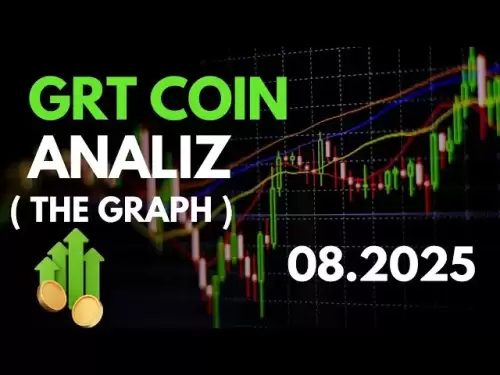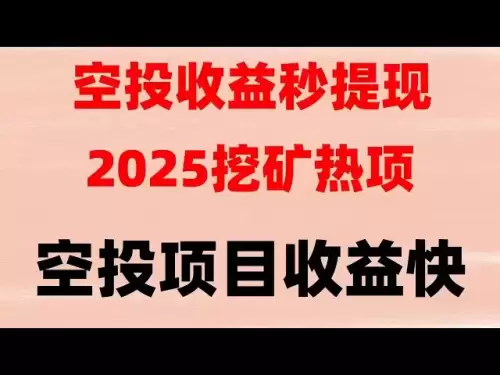 |
|
 |
|
 |
|
 |
|
 |
|
 |
|
 |
|
 |
|
 |
|
 |
|
 |
|
 |
|
 |
|
 |
|
 |
|
在机构采用和权力下放工作中,探索比特币在保留货币状况的旅程。导航波动和监管障碍。

Bitcoin: From Speculative Asset to Reserve Currency in a Decentralized World?
比特币:从投机资产到在分散世界中保留货币?
Bitcoin's transition towards becoming a reserve currency is gaining momentum, marked by increased institutional interest and a shift in the global financial landscape. This evolution, however, is not without its challenges. Let's dive into the current state of Bitcoin and its potential future.
比特币向储备货币的过渡正在获得势头,这是机构利益的增加和全球金融格局的变化。但是,这种演变并非没有挑战。让我们深入研究比特币的当前状态及其潜在的未来。
Institutional Adoption: A Game Changer
机构采用:改变游戏规则的人
Institutional adoption is no longer a distant prospect but a present reality. Spot Bitcoin ETFs have become significant players, managing billions in assets. BlackRock's iShares Bitcoin Trust (IBIT) is a prime example. This surge signifies a strategic shift as institutions allocate portions of their portfolios to Bitcoin, recognizing it as a core asset. The approval of ETFs has democratized access and injected much-needed liquidity into the market, notably reducing Bitcoin's notorious volatility.
机构采用不再是遥远的前景,而是当前的现实。现货比特币ETF已成为重要的参与者,管理数十亿美元的资产。贝莱德的iShares比特币信托(IBIT)是一个很好的例子。当机构将其投资组合的一部分分配给比特币时,这种涌现表示战略转变,并认为这是核心资产。 ETF的批准已民主化,并将急需的流动性注入了市场,特别是降低了比特币臭名昭著的波动。
Traditional finance firms are also getting in on the action. Companies like Fidelity and BNY Mellon are offering custody services for digital assets, while hedge funds and sovereign wealth funds are quietly accumulating Bitcoin as a hedge against geopolitical instability. Capital B, a European company, recently increased its Bitcoin holdings, signaling confidence in its long-term value. MicroStrategy's substantial Bitcoin treasury further underscores this trend.
传统的财务公司也正在采取行动。 Fidelity和BNY Mellon等公司正在为数字资产提供监护权服务,而对冲基金和主权财富基金正在悄悄地积累比特币,以此作为对冲地缘政治不稳定的对冲。 Capital B是一家欧洲公司,最近增加了其比特币持有量,表明对其长期价值的信心。 MicroStrategy的大量比特币国库进一步强调了这一趋势。
Capital Flows and Market Dynamics
资本流和市场动态
The influx of capital into Bitcoin is reshaping its role in global markets. Institutional demand creates a positive feedback loop: increased liquidity reduces volatility, which, in turn, attracts more institutional capital. However, it's essential to be aware of potential treasury risks and the centralization of Bitcoin in institutional portfolios, as highlighted by Willy Woo. Centralization could compromise Bitcoin's decentralized ethos, creating vulnerabilities if custodians or regulators exert too much control.
将资本涌入比特币正在重塑其在全球市场中的作用。机构需求创造了积极的反馈循环:增加的流动性降低了波动性,这反过来又吸引了更多的机构资本。但是,正如威利·沃(Willy Woo)所强调的那样,要了解潜在的国库风险和比特币在机构投资组合中的集中化至关重要。集中化可能会损害比特币的分散精神,如果保管人或监管机构施加太多控制权,就会造成脆弱性。
The relationship between Bitcoin and traditional assets is complex. While Bitcoin tends to perform well when the U.S. dollar weakens, a stronger dollar could tighten global liquidity and put pressure on speculative assets. Monitoring macroeconomic indicators is crucial for gauging Bitcoin's performance in a diversified portfolio.
比特币与传统资产之间的关系很复杂。虽然比特币在美元削弱时倾向于表现良好,但更强大的美元可以收紧全球流动性并施加投机资产的压力。监视宏观经济指标对于在多元化的投资组合中衡量比特币的性能至关重要。
Decentralization: The Core Advantage (and Challenge)
权力下放:核心优势(和挑战)
Bitcoin's fixed supply and periodic halving events set it apart from fiat currencies. This scarcity makes it an appealing hedge against inflation and currency devaluation. Even central banks, like the Czech National Bank, are starting to consider Bitcoin as a neutral, politically independent reserve asset.
比特币的固定供应和周期性减半事件使其与法定货币区分开来。这种稀缺使它成为抵制通货膨胀和货币贬值的对冲。甚至像捷克国家银行一样,甚至中央银行也开始将比特币视为中立,政治上独立的后备资产。
However, decentralization also presents challenges. Without a central authority, Bitcoin's adoption relies on consensus-driven governance, which can sometimes lead to fragmentation or regulatory hurdles. While the U.S. has taken steps to promote stablecoins and decentralized alternatives, overly rigid regulations could stifle innovation.
但是,权力下放也带来了挑战。没有中央权威,比特币的采用依赖于共识驱动的治理,这有时会导致分裂或监管障碍。尽管美国已采取措施促进稳定的替代方案,但过于严格的法规可能会扼杀创新。
Navigating the Road Ahead
在前方的道路上航行
For Bitcoin to achieve true reserve currency status, several challenges must be addressed:
为了使比特币达到真正的储备货币状况,必须解决一些挑战:
- Regulatory Clarity: Harmonized global frameworks are needed to protect innovation without hindering growth.
- Centralization Risks: Diversifying custody solutions and supporting decentralized finance (DeFi) protocols can mitigate the risk of custodial control.
- Market Volatility: Employing hedging strategies can help manage Bitcoin's price swings.
Investment Strategies for the Future
未来投资策略
Given Bitcoin's trajectory, investors should consider:
鉴于比特币的轨迹,投资者应考虑:
- Allocating to Spot Bitcoin ETFs.
- Diversifying with multi-coin strategies.
- Monitoring macroeconomic trends.
- Supporting decentralized infrastructure.
The Bottom Line
底线
Oliver Michel, CEO of Tokentus Investment AG, even suggests that XRP could emerge as the “World’s Reserve Bridge Currency,” facilitating cross-border payments. While the focus here is on Bitcoin, the broader trend of crypto adoption is undeniable.
Tokentus Investment AG的首席执行官Oliver Michel甚至暗示XRP可以成为“世界储备桥梁货币”,从而促进了跨境支付。尽管这里的重点是比特币,但采用加密货币的广泛趋势是不可否认的。
Bitcoin's journey to becoming a reserve currency is a complex interplay of institutional adoption, capital flows, and decentralization. While challenges persist, its unique advantages make it a compelling candidate for the future of global finance. So, buckle up and enjoy the ride as we watch Bitcoin redefine the very nature of money. Who knows what surprises this decentralized world holds?
比特币成为储备货币的旅程是机构采用,资本流和权力下放的复杂相互作用。尽管挑战仍然存在,但其独特的优势使其成为全球金融未来的引人注目的候选人。因此,当我们观看比特币重新定义金钱的本质时,搭扣并享受旅程。谁知道这个分散的世界所拥有的令人惊讶的是什么?
免责声明:info@kdj.com
所提供的信息并非交易建议。根据本文提供的信息进行的任何投资,kdj.com不承担任何责任。加密货币具有高波动性,强烈建议您深入研究后,谨慎投资!
如您认为本网站上使用的内容侵犯了您的版权,请立即联系我们(info@kdj.com),我们将及时删除。
-

-

- 信任,透明度和用户安全证明:保持加密货币真实
- 2025-08-11 17:29:15
- 导航加密世界需要信任。探索像MEXC这样的交流如何通过创新计划优先考虑用户安全性和透明度。
-

-

-

-

-

-

-




























































